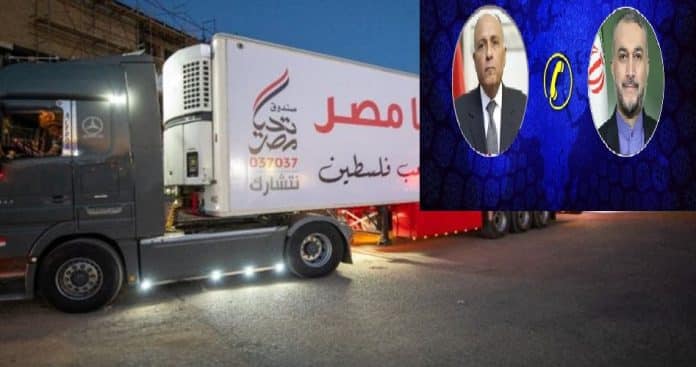Iranian Foreign Minister Hossein Amir-Abdollahian and his Egyptian counterpart, in a phone talk, stressed the need for sending humanitarian aid to the war-torn Gaza Strip.
Amir-Abdollahian and the Egyptian Foreign Minister Sameh Shoukry held a phone conversation on Monday night to discuss the situation in Palestine.
The two Iranian and Egyptian top diplomats stressed the need for the continuation of consultations between Tehran and Cairo regarding ways to end the current crisis in Palestine and the brutal attacks of the Zionist regime against civilians in Gaza and the West Bank.
Amir-Abdollahian also announced the readiness of the Iranian Red Crescent Society to dispatch humanitarian aid to the Gaza Strip through Egypt.
Shoukry, for his part, hailed Iran’s position regarding sending humanitarian aid to the Gazan people.
He also emphasized the continuation of bilateral and multilateral consultations to help stop the war establish a ceasefire in Gaza and send humanitarian aid to the Gaza residents.
The besieged enclave, home to 2.3 million people, has been in dire need of humanitarian aid after Israel cut off food, fuel and electricity supplies before launching a bombing campaign.
More than 10,000 Palestinians, including many children, have been killed in the relentless bombardments. Israel says it’s targeting Hamas fighters who killed more than 1,400 people in the October 7 attack in southern Israel.
It was earlier reported that, at least eight planes carrying aid from Turkey, the United Arab Emirates, Qatar, Jordan and Tunisia have landed at El Arish International Airport in Egypt’s Sinai Peninsula.
India has sent medical and disaster relief to El Arish on Sunday.
Rwanda has sent 16 tons of humanitarian aid to Gaza.
However, some EU countries – including Germany, Denmark and Sweden – have temporarily suspended their aid to Gaza as a response to the Hamas attacks.
The first convoy of 20 trucks crossed from Egypt into Gaza, and the second convoy arrived the day after.
More than 200 trucks carrying roughly 3,000 tonnes of aid have been positioned near the crossing on the Egyptian side waiting for Israeli approval to drive into Gaza.
Jeremy Hopkins, the UNICEF representative in Egypt, said this is not enough to cover the needs of the people in Gaza and instead there should be “at least 100, 200 trucks going in per day”.
More than a million people have been displaced, and tens of thousands have been wounded and need urgent medical care in addition to the people needing food and other basic necessities.
The aid convoys have carried medical supplies from the World Health Organization (WHO), such as dressings, anaesthetics and painkillers.
The trucks have also contained food, including tuna tins, tomato paste and wheat flour.
They also have transported bottled drinking water. The first convoy had enough water for 27,000 people for one day, and the second had enough for 22,000 people for a day.
The UN humanitarian office said the volume of aid entering so far represents just 4 percent of the daily average needed before the hostilities and a fraction of what is now needed as food, water, medicines and fuel stocks run out.
The aid sent to Gaza does not include fuel, which is crucial, according to aid groups.
Doctors from Gaza’s only cancer hospital have warned that they are running perilously low on fuel and could be forced to shut down.
The aid entered through the Rafah border crossing between Egypt and Gaza, which was opened to allow the small amount of aid to enter Gaza.
Supplies coming into Gaza through Rafah require Israeli approval.
Israel said it will not prevent humanitarian aid from entering Gaza through Egypt after pressure from its international allies to ease its 10-day siege on the Palestinian territory.
Trucks are waiting outside the border, so they can enter Gaza whenever the border opens next.
Hopkins said the border needs to be open on a continuous basis.













